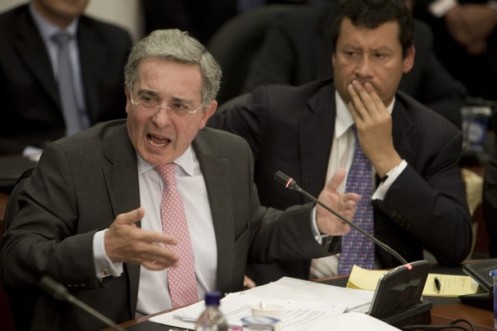|
|
| William Fernando Martinez/AP - Colombia's former President Alvaro Uribea close U.S. ally throughout his eight-year tenure, speaks during a hearing about his alleged responsibility in the wiretapping of political rivals, journalists and justice officials in Bogota. William Fernando Martinez/AP |
The Obama administration often cites Colombia’s thriving democracy as proof that U.S. assistance, know-how and commitment can turn around a potentially failed state under terrorist siege.
The country’s U.S.-funded counterinsurgency campaign against a Marxist rebel group — and the civilian and military coordination behind it — are viewed as so successful that it has become a model for strategy in Afghanistan.
But new revelations in long-running political scandals under former president Alvaro Uribe, a close U.S. ally throughout his eight-year tenure, have implicated American aid, and possibly U.S. officials, in egregious abuses of power and illegal actions by the Colombian government under the guise of fighting terrorism and drug smuggling.
American cash, equipment and training, supplied to elite units of the Colombian intelligence service over the past decade to help smash cocaine-trafficking rings, were used to carry out spying operations and smear campaigns against Supreme Court justices, Uribe’s political opponents and civil society groups, according to law enforcement documents obtained by The Washington Post and interviews with prosecutors and former Colombian intelligence officials.
The revelations are part of a widening investigation by the Colombian attorney general’s office against the Department of Administrative Security, or DAS. Six former high-ranking intelligence officials have confessed to crimes, and more than a dozen other agency operatives are on trial. Several of Uribe’s closest aides have come under scrutiny, and Uribe is under investigation by a special legislative commission.
U.S. officials have denied knowledge of or involvement in illegal acts committed by the DAS, and Colombian prosecutors have not alleged any American collaboration. But the story of what the DAS did with much of the U.S. aid it received is a cautionary tale of unintended consequences. Just as in Afghanistan and other countries where the United States is intensely focused on winning counterterrorism allies, some recipients of aid to Colombia clearly diverted it to their own political agendas.
For more than a decade, under three administrations, Colombia has been Washington’s closest friend in Latin America and the biggest recipient of military and economic assistance — $6 billion during Uribe’s 2002-10 presidency. The annual total has fallen only slightly during the Obama administration, to just over a half-billion dollars in combined aid this year.
Although significant gains were made against the rebels and drug-trafficking groups, former high-ranking intelligence agents say the DAS under Uribe emphasized political targets over insurgents and drug lords. The steady flow of new revelations has continued to taint Colombia’s reputation, even as a government led by Uribe’s successor and former defense minister, Juan Manuel Santos, has pledged to replace the DAS with a new intelligence agency this fall.
Prosecutors say the Uribe government wanted to “neutralize” the Supreme Court because its investigative magistrates were unraveling ties between presidential allies in the Colombian congress and drug-trafficking paramilitary groups. Basing their case on thousands of pages of DAS documents and the testimony of nine top former DAS officials, the prosecutors say the agency was directed by the president’s office to collect the banking records of magistrates, follow their families, bug their offices and analyze their court rulings.
Source: Washington Post
